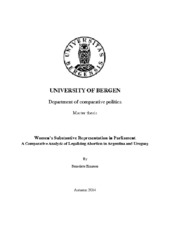Women's substantive representation in parliament: A comparative analysis of legalising abortion in Argentina and Uruguay
Master thesis
Permanent lenke
https://hdl.handle.net/1956/9154Utgivelsesdato
2014-11-19Metadata
Vis full innførselSamlinger
Sammendrag
This thesis is a comparative study of substantive representation of women in parliament, focusing on the process of abortion legislation in Argentina and Uruguay. Women's representation in parliament has increased across Latin America over the last 20 years due to the adoption of gender quotas. The expectation is that more women in parliament will change politics and lead to improvements in women's rights. When women's interests are promoted, substantive representation occurs. Given that Latin America is the region in the world with the most strict abortion policies, it is puzzling that the Uruguayan Congress with only 12 % women has legalized abortion, while the Argentine Congress with 36 % women has failed to do so. I use process-tracing methods and in-depth interviews of central actors in Argentina and Uruguay to analyse the process-oriented and outcome-oriented aspects of substantive representation. I find that although the elements connected to the process-oriented aspect (where does substantive representation occur, why is substantive representation attempted, who acts in substantive representation, and how is substantive representation expressed) increase the chances of outcome (here: abortion legislation), external factors related to the context in which the legislative processes unfold provides a more comprehensive explanation for why abortion has been legalized in Uruguay but not in Argentina
